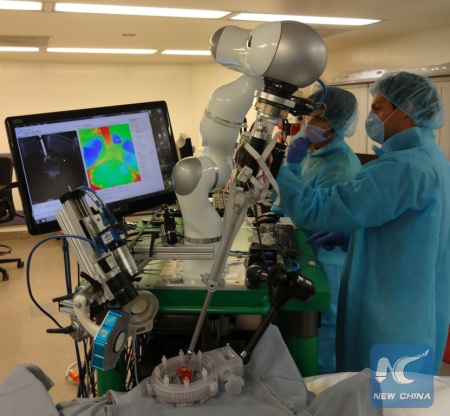
Dr. Azad Shademan and Ryan Decker during supervised autonomous in-vivo bowel anastomosis performed by the Smart Tissue Autonomous Robot (STAR). (Credit: Axel Krieger)
U.S. doctors have shown for the first time that soft tissue surgery can now be performed entirely by a robot, putting surgery one step closer into the realm of intelligent machines.
The so-called Smart Tissue Autonomous Robot (STAR) succeeded in suturing and reconnecting bowel segments in living pigs, a procedure known as intestinal anastomosis, and all the animals survived with no complications, they reported Wednesday in the U.S. journal Science Translational Medicine.
"The outcomes were surprising to us that consistence throughout performance was better than surgeons," Peter Kim, associate surgeon-in-chief at Children's National Health System in Washington, D.C. told reporters during a teleconference.
"The goal again is not to replace surgeons but by having a tool like this and by making the procedures more intelligent, we can ensure sort of better outcomes for patients," Kim said.
While robot-assisted surgery is already used on patients, the execution of soft tissue surgery has remained entirely manual, largely because the unpredictable changes in soft tissues that occur during surgery, requiring the surgeon to make constant adjustments.
Equipped with a robotic arm and surgical tools, STAR combines smart imaging technologies and fluorescent markers to navigate and adapt to the complexities of soft tissue.
The researchers tested their robot against manual surgery by expert surgeons, laparoscopy and robot-assisted surgery with the well-known da Vinci Surgical System.
The results showed STAR proved superior to all approaches in anastomosis surgeries on both inanimate porcine tissue and living pigs.
Although this technology removes the surgeon's hands from the procedure, it still utilizes surgeons as supervisors, at least for the moment.
According to Kim, they tweaked what the robot was doing about 40 percent of the time. The other 60 percent of the time, the machine did it by itself without any interference.
"We are like expectant parents, we were, every single one of us, were watching very carefully," said Kim. "But fundamentally proof here is being able to show that soft tissue surgery that could not be autonomously done can be done. ... I expect that at some point this could be available to anybody and everybody."
Megan Frisk, senior editor at the journal, hailed at the teleconference this achievement as "a new era of robotic surgeries that could reduce error and complications for patients undergoing everything from tumor removal to airway reconstruction."
Currently, more than 44.5 million soft tissue surgeries are performed in the United States each year.


















































